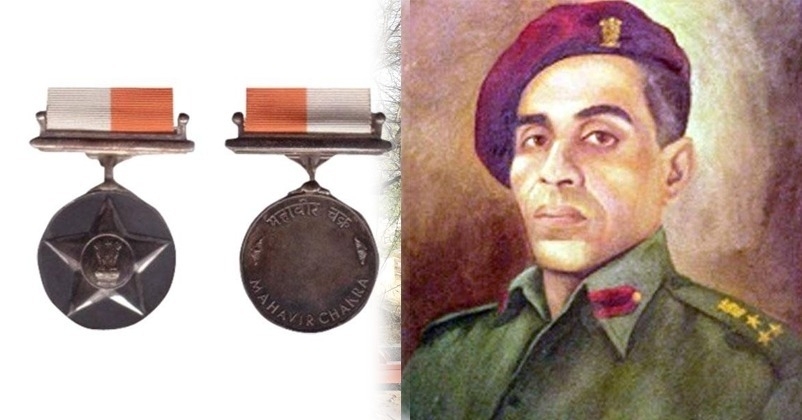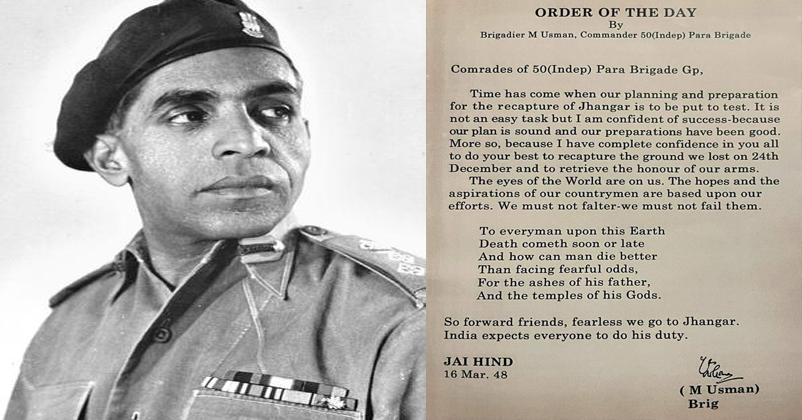3 July, 1948: Remembering "Lion of Naushera”, Mahavir Chakra awardee Brigadier Usman: Hero of India-Pakistan War 1947-48
Total Views |

03 July, 1948 marks the death anniversary of Brigadier Mohammad Usman, Mahavir Chakra Awardee (MVA) who was the highest ranking officer of Indian Army killed in action during India-Pakistan war of 1947-48. Very few even in the armed forces have been accorded with titles which not only honoured the individual but also became an inspiration for generations to come.
Mohammad Usman was born in Bibipur, now Mau, Uttar Pradesh, in the Azamgarh district, United Provinces, British India on 15 July 1912 to Jamilun Bibi and Mohammad Faqooq Khunambir. Usman later made up his mind to join the Army, and despite the limited opportunities for Indians to get commissioned ranks and despite intense competition, he succeeded in gaining admission to the prestigious Royal Military Academy Sandhurst (RMAS).
Usman was promoted to the rank of Lieutenant on 30 April 1936 and Captain on 31 August 1941. From February to July 1942, he attended the Indian Army Staff College at Quetta. By April 1944, he was a temporary Major. He served in Burma and was mentioned in dispatches as a temporary Major in the London Gazette 27 September 1945. He commanded the 14th battalion of the 10th Baluch Regiment (14/10 Baluch) from April 1945 to April 1946.

During the partition of India, Usman, being a Muslim officer in the Baluch Regiment, was under intense pressure from the Pakistani leadership to opt for the Pakistan Army. However, despite the fact he was promised a future position as the Pakistan Army Chief by none other than Mohammad Ali Jinnah himself, he was unconvinced. When the Baluch Regiment was allotted to Pakistan, Usman was transferred to the Dogra Regiment.
During the 1947-48 India Pakistan war, Brigadier Usman was the Commander of 77 Para Brigade, was given the charge of 50 Para Brigade at Jhangar which was captured by Pakistan Army. During the defence of Naushera against overwhelming odds and numbers, Indian forces inflicted around 2000 casualties on the Pakistanis (about 1000 dead and 1000 wounded) while Indian forces suffered only 33 dead and 102 wounded. His defence earned him the nickname Lion of Naushera.
Pakistani forces then announced a sum of Rs 50,000 as a prize for his head. Unaffected by praise and congratulations, Brig Usman continued to sleep on a mat laid on the floor as he had vowed that he would not sleep on a bed till he recaptured Jhangar, from where he had to withdraw in late 1947.
The Indian force led by Brigadier Usman recaptured Jhangar and also safeguarded Naushera which gave him the name 'Naushera ka Sher', ‘Lion of Naushera’.
Pakistan brought it’s regular forces into the fray in May 1948. Jhangar was once again subjected to heavy artillery bombardment, and many determined attacks were launched on Jhangar by the Pakistani army. However, Brig Usman frustrated all their attempts to recapture it. It was during this defence of Jhangar that Brig Usman was killed on July 3, 1948, by an enemy shell. He was 12 days short of his 36 birthday. His last words were "I am dying but let not the territory we were fighting for fall for the enemy”.
Brigadier Usman was religious yet a staunch loyalist. On receiving reports that 50000 tribal marauders had taken a refuge at a mosque near Naushera and that out troops were hesitant in firing at the religious structure, he reached there personally and ordered fire to be opened, stating that the place no longer remain religious as it had been occupied by marauders.
He was awarded Maha Vir Chakra (posthumously),the second-highest military honour for gallantry in the face of the enemy. Indian Prime Minister Jawahar Lal Nehru and his cabinet colleagues attended the funeral of Usman- "the highest ranking military commander till date to lay down his life in the battlefield”. He was given a state funeral of a martyr.
Brigadier Mohammed Usman remains one of the greatest soldiers and an inspiring military leader India has ever produced.

